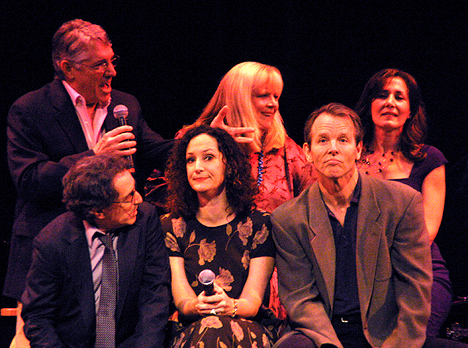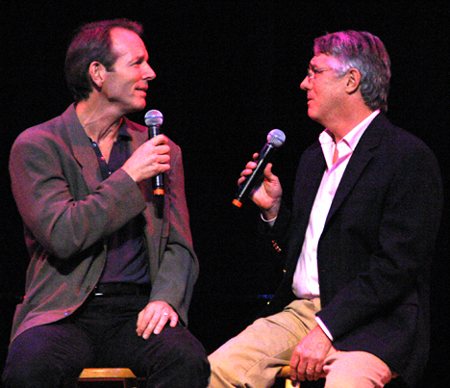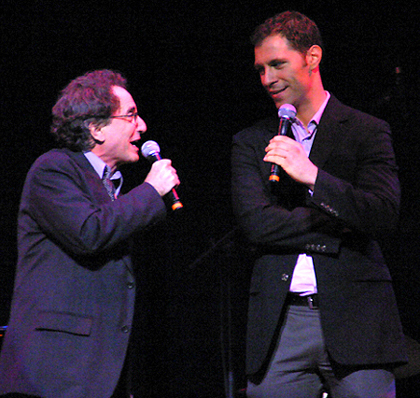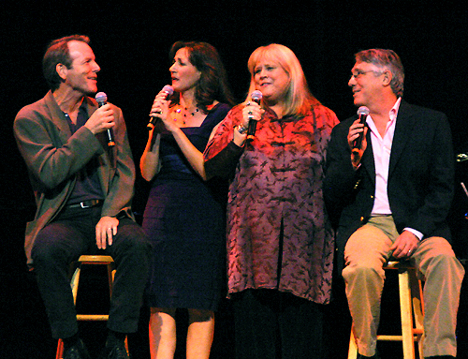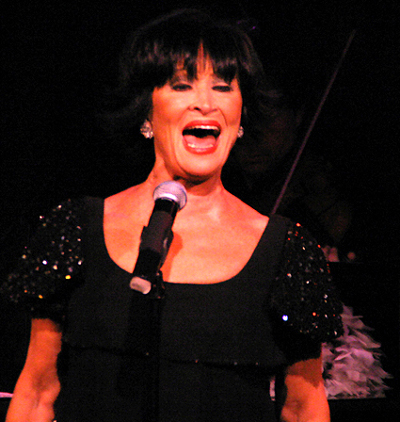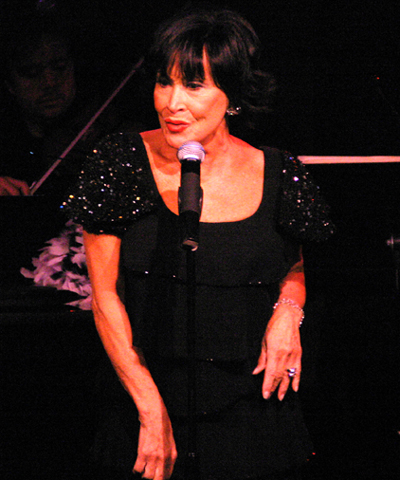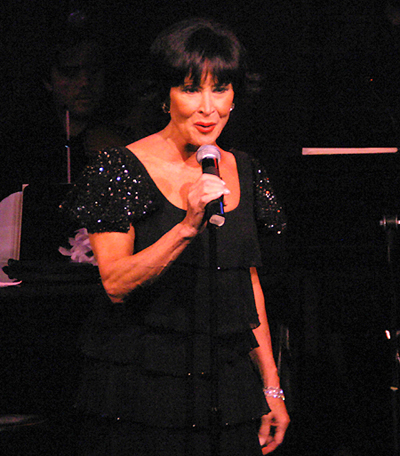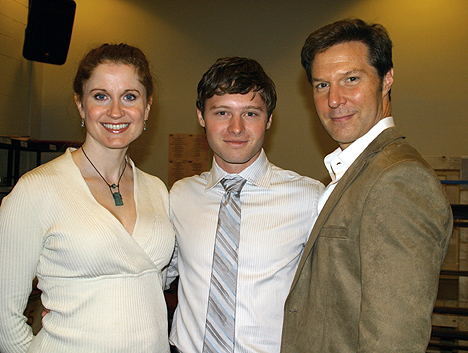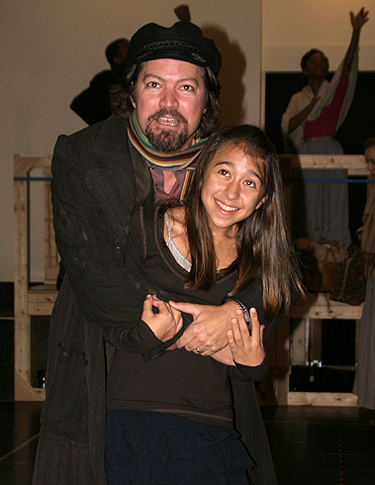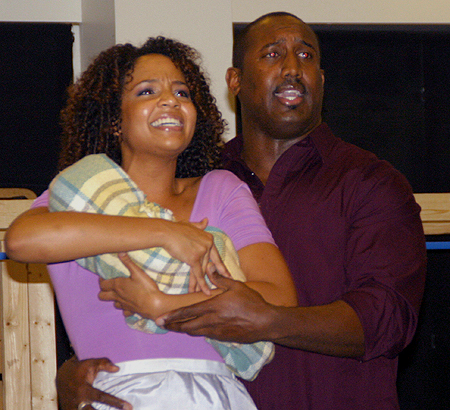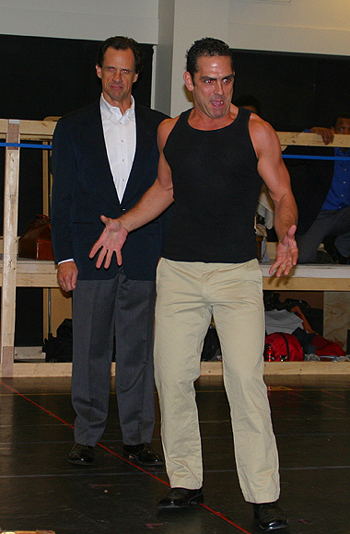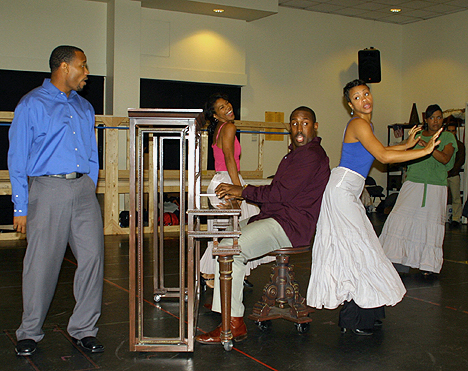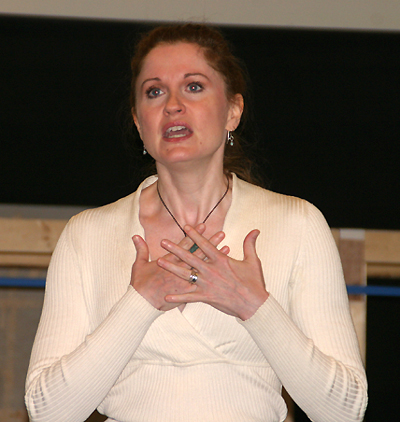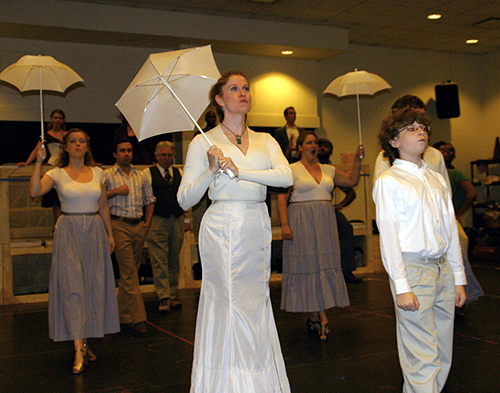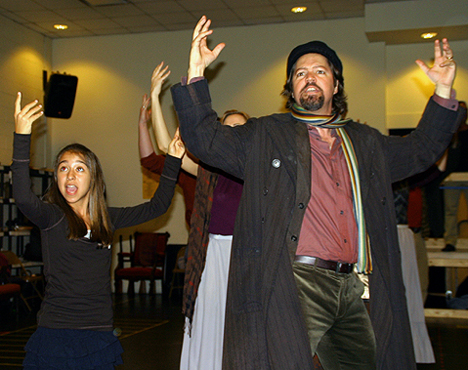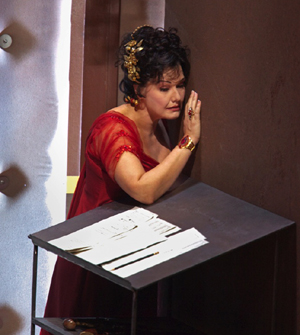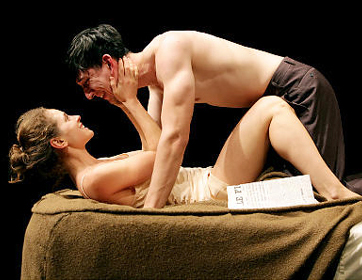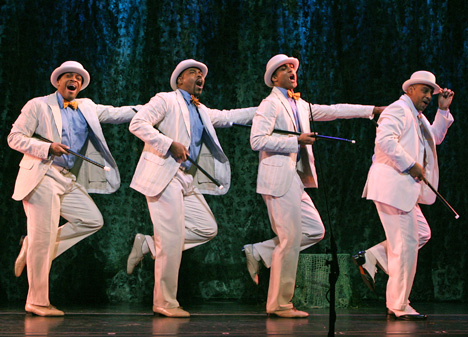
"The Misbegotten G.O.P."
In anticipation of seeing the Broadway revival of Finian's Rainbow, a production based on the excellent City Center Encores! presentation, I've been listening to the various recordings of this great musical, and I was reminded that some of my favorite lyrics from the show score are nowhere to be heard on the movie soundtrack album. (See below for details.)
This is no huge surprise. From the 1930s through the '60s, it was common practice for "adult" content to be censored out of all sorts of films. (One especially egregious example: A Streetcar Named Desire). And since musicals in those days were generally thought of as family entertainment, any lyrics that were remotely sexual or scatological in nature were almost always excised from the movie versions. Also frequently embargoed were oaths, curses, and profanities, including "damn" and "hell." Less often, but in some notable cases (such as Finian's), lyrics were changed for political reasons.
Given what we see and hear in today's films, it's hard to believe that this kind of bowdlerization ever occurred. But it sure did, as evidenced by the following rundown of lyrics from musicals that were considered too hot -- in one way or another -- to be retained for the movies. Lengthy though it may be, this is by no means an exhaustive survey; I'm sure I've left out some juicy examples, so please email me and let me know what's not on my list.
********************
Annie Get Your Gun, lyrics and music by Irving Berlin
Although Betty Hutton's mugging in the 1950 M-G-M film version of this monster hit musical might be considered vulgar, the studio drew the line at anything approaching vulgarity in the lyrics. As written by Berlin and as originally performed by the one-and only Ethel Merman, the song "Doin' What Comes Natur'lly" contained some ever-so-slightly risqué jokes, e.g.: "My tiny baby brother, who never read a book, knows one sex from the other -- all he had to do was look," and "Sister Rose has lots of beaux, although we have no parlor; she does fine behind a tree, doin' what comes natur'lly." These were snipped out and replaced with far less amusing lines such as, "My uncle don't pay taxes, his address never gives. They can't collect his taxes, for they don't know where he lives." Dull, dull, dull.
Brigadoon, lyrics by Alan Jay Lerner, music by Frederick Loewe
Both of the character Meg Brockie's songs in this show, "The Love of My Life" and "My Mother's Wedding Day," were cut from the movie version -- the former presumably because it's all about sex, the latter perhaps because it's punchline has to do with the singer having been born out of wedlock. Oddly enough, a rather saucy line in Charlie Dalrymple's song "I'll Go Home With Bonnie Jean" -- the one that goes "Hello to married men I've known, I'll soon have a wife and leave yours alone" -- was retained. That must have sounded quite racy to moviegoers in 1954!
Carousel, lyrics by Oscar Hammerstein, music by Richard Rodgers
Carnival barker Billy Bigelow is a pretty rough customer. In the stage version of this R&H masterpiece, he soliloquizes that "no pot-bellied, baggy-eyed bastard" will boss his son around, and later sings of his kid: "I'm damned if he'll marry his boss's daughter, a skinny-lipped virgin with blood like water." But not in the movie! The lyrics were changed to "baggy-eyed bully," "I'm hanged if he'll marry...," and "skinny-lipped lady." Also, whereas the original lyric of the song "Stonecutters Cut it On Stone" had a girl singing of marriage, "It's cookin' and scrubbin' and sewin' all day, and God-knows-whattin' all night," that last bit was changed to "...not much sleepin' at night" for the movie. (Actually, this section of the song was cut from the film but is included on the soundtrack album.)
Damn Yankees, lyrics and music by Richard Adler and Jerry Ross
The show score includes a number called "The Game," all about the Washington Senators avoiding sex in order to better focus on playing baseball. This was cut entirely from the movie version. On Broadway, in the song "A Little Brains, A Little Talent," Gwen Verdon as Lola sang: "You've seen the sign that says 'George Washington once slept here.' Well, though nobody spied him, guess who was beside him?" For the movie, this was changed to "Delilah claimed a haircut made her man a weakling, but when she turned the lamps on, guess who was with Samson?" (Apparently, it was considered beyond the pale for audiences in 1958 to hear it implied that the lady had slept with the Father of Our Country, but it was okay for her to have been intimate with a Biblical figure.) Later in the original lyrics of the same song, there's a section that goes: "Bring on that boy, he'll be a toy to Lola, just one more case she can erase with that old boffola." But in the movie version, the last line is "...with that old zambola." (You may well ask, "What the heck does 'zambola' mean?") I'll never forgot hearing Forbidden Broadway-meister Gerard Alessandrini wonder aloud why this lyric was changed and receiving a concise explanation from our mutual friend Phill George: "Gerard, to boff somebody means to fuck them." Well, there you have it!
The Fantasticks, lyrics by Tom Jones, music by Harvey Schmidt
Though the inclusion of a song about "rape" in this generally sweet, lovely, romantic musical raised few eyebrows when the show opened in 1960, that song became very problematic with the raising of people's consciousness about women's rights. Of course, the rape referred to in The Fantasticks is an abduction -- as in "the rape of the Sabine women" -- rather than a male having forcible, non-consensual sex with a female. No matter; the word itself became so toxic that the entire song was replaced for the little-seen film version. And though the music of the song remains in the current production of the show at the Jerry Orbach Theater, the lyrics have been rewritten and the word "rape" is gone, gone, gone.
Finian's Rainbow, lyrics by E.Y. Harburg, music by Burton Lane
Here we have one of those relatively rare instances where a lyric was changed for political reasons. In the 1947 Broadway production, the marvelously witty song "The Begat" contained a swipe at "the misebegotten G.O.P." But that line was changed to "the misbegotten V.I.P." for the 1968 film version, presumably because the studio didn't want to offend Republicans. Also: Whereas Sharon McLonergan sang "If this isn't love, I'm Carmen Miranda; if this isn't love, it's Red progaganda" in the the original lyric of another great song from the show, the movie has her sing "If this isn't love, there's no Glocca Morra; if this isn't love, I'm Zsa Zsa Gabora." But that change, which I believe was first made for the 1960 Broadway revival of the show, was probably effected because the original lines were considered dated, rather than having been made to avoid angering the Russkies. I'm not sure which version of these particular lyrics is used for the current revival, but the "G.O.P." line in "The Begat" was definitely included in the Encores! production (see photo above), and it got a big laugh.
Gypsy, lyrics by Stephen Sondheim, music by Jule Styne
In the 1959 Broadway production (and on the cast recording), in the song "You Gotta Get a Gimmick," the inimitable Miss Mazeppa sings "You can pull all the stops out till they call the cops out, grind your behind till you're banned." In the 1962 movie version (and on the soundtrack album), she's a little more ladylike, singing "....grind till you're fined or you're banned."
Kiss Me, Kate, lyrics and music by Cole Porter
Given Porter's talent for sophisticated, adult humor, it's no shock that a great many of his lyrics for the 1948 Broadway hit Kiss Me, Kate had to be rewritten -- by the great man himself -- for the 1953 film version. Among the changes: In "Too Darn Hot," the line "According to the Kinsey report..." became "According to the latest report..." In "I Hate Men," the line "Of course, I'm awfully glad that mother had to marry father" became "...that mother deigned to marry father," while "his business is the business which he gives his secretary" became "his business is the business with his pretty secretary," and "I'd rest a virgin rather" became "I'd rest a maiden rather." In "I've Come to Wive it Wealthily in Padua," Fred/Petruchio's "I have oft stuck a pig before" was changed to "I have oft met a boar before," "..while she powders her goddamned nose" was changed to "...while she powders her doggone nose," and "...in the dark, they [women] are all the same" was changed to "in a brawl, they are all the same." The lyric "There's an oil man known as Tex who is keen to give me checks, and his checks, I fear, mean that sex is here to stay" was cut entirely from "Always True to You (in My Fashion)," as were the lines "let her sample your measure for measure" and "make her tike it, what's more, as you like it" from "Brush Up Your Shakespeare." Oh yes, and the delightful "puberty/Schuberty" rhyme was cut from "Where Is the Life That Late I Led?" On the other hand, nearly all of the double-entendres in the outrageously funny "Tom, Dick, and Harry" were kept intact, though the lyric "to give a social goose to thy position" was changed to "...a social lift to thy position." Go figure!
Oklahoma!, lyrics by Oscar Hammerstein, music by Richard Rodgers
What could be more wholesome than this beloved piece of Americana? Still, it was felt that one line of Hammerstein's lyrics for the song "Kansas City" as written for the original 1943 Broadway production had to be reworked for the 1955 Hollywood screen adaptation: Will Parker's paen to a dancing girl, "I could swear that she was padded from her shoulder to her heel, but later in the second act, when she begun to peel, she proved that everything she had was absolutely real!" was changed to "...but then she started dancin', and her dancin' made me feel that every single thing she had was absolutely real." Well, that sure cleaned it up!
On the Town, lyrics by Betty Comden and Adolph Green, music by Leonard Bernstein
Sailors are known for their dirty mouths, but not the sailors in the film version of this musical. Whereas their stage counterparts sang "New York, New York, a hell of a town," the movie's gobs (played by Frank Sinatra, Gene Kelly, and Jules Munshin) sing "New York, New York, a wonderful town."
The Pajama Game, lyrics and music by Richard Adler and Jerry Ross
Typical 1950s fluff, you say? Maybe so, but several of the show's lyrics were considered a bit too adult for the movie, and so they were reworked. On Broadway, Janis Paige as Babe Williams sang of her boss, "All ya gotta do is be polite with him, and they have you spending the night with him," but in the movie, Doris Day as Babe sings "All ya gotta do, it seems, is work for him, and they've got you goin' berserk for him." Whereas Janis sang "Whaddaya think they charge for ham now? Got so a buck ain't worth a damn now" in the "Small Talk" number, Doris sings "Whaddaya think they charge for fruit now? Got so a buck ain't worth a hoot now." When Reta Shaw and Eddie Foy, Jr. performed "I'll Never Be Jealous Again" on stage, Shaw sang "her blouse is unbuttoned, her stockings are not very straight; later on, she gets a bouquet with a card in it saying, 'To baby, you were great!" and, later, "...a shirt and a tie and a pair of pants in a nice, neat, little pile" -- but for the movie, these lines were changed to "her lipstick is smeared and she can't seem to walk very straight; then she drops a bottle of rye and, not battin' an eye, says a train wreck made her late," and "...a hat and a tie and pair of socks in a nice, neat little pile." Finally, the lyric "Seven and a half cents doesn't buy a hell of a lot" in the show's climactic number was changed to "...doesn't buy a heck of a lot."
Pal Joey, lyrics by Lorenz Hart, music by Richard Rodgers
The movie loosely based on this groundbreaking musical has several strikes against it, including the fact that several of Lorenz Hart's lyrics were poorly rewritten by someone else after his death. "Bewitched, Bothered, and Bewildered" was the biggest casualty, with much of Hart's work changed for the worse. Needless to say, the song's best quatrain -- "When he speaks, he is seeking / Words to get off his chest / Horizontally speaking / He's at his very best!" -- was given the heave-ho.
1776, lyrics and music by Sherman Edwards
Another rare case of censorship for political reasons -- and this time, an entire song was lost, if only temporarily. "Cool, Considerate Men," a broadside against the right-wing mindset, was filmed but cut from the final release prints of the movie version, reportedly at the behest of then-president Richard Nixon. (One more reason to despise that man.) Happily, the number has been restored for DVD.
Show Boat, lyrics by Oscar Hammerstein, music by Jerome Kern
The original Broadway production of this epoch-making musical famously opened with a group of black stevedores singing "Niggers all work on the Mississippi, niggers all work while the white folks play." Those lyrics didn't last very long! That section of the song was cut entirely from the 1951 movie version of the property, and the lyrics were rewritten for the 1936 movie and for most stage revivals. (Among the alternatives: "Darkies all work...," "Colored folks work...," and "Here we all work....") Far less well-known yet fun to note is a small but significant change in the song "Life Upon the Wicked Stage" that was made for the 1951 film: the lyric "I've got virtue, but it ain't been tested," which Hammerstein wrote for the 1946 Broadway revival of the show, was changed to "I've got talent, but it ain't been tested."
West Side Story, lyrics by Stephen Sondheim, music by Leonard Bernstein
Generally speaking, the tremendously popular 1961 film is very faithful to the stage script and score of this musical theater masterwork, but a couple of changes in the lyrics were deemed necessary for the big screen. Where Riff sang "if the spit hits the fan" in the "Jet Song" on Broadway, he sings "let 'em do what they can" in the movie, presumably because it was felt that "spit" sounded too much like "shit." And in the "Tonight" ensemble, Anita's "He'll walk in hot and tired, so what? Don't matter if he's tired, as long as he's hot" was changed to "He'll walk in hot and tired, poor dear. Don't matter if he's tired, as long as he's here," while the Riff/Tony exchange "Womb to tomb / Sperm to worm" became "One, two, three! One, two, three!" In "Gee, Office Krupke," the lines "My father is a bastard, my ma's an s.o.b., my grandpa's always plastered..." were rewritten as "My daddy beats my mommy, my mommy clobbers me, my grandpa is a commie...," and "Dear kindly social worker, they say go earn a buck, like be a soda jerker, which means like be a schmuck" became "Dear kindly social worker, they say go get a job, like be a soda jerker, which means like be a slob." I believe Stephen Sondheim himself did these rewrites, but I suspect he was NOT happy about them.
